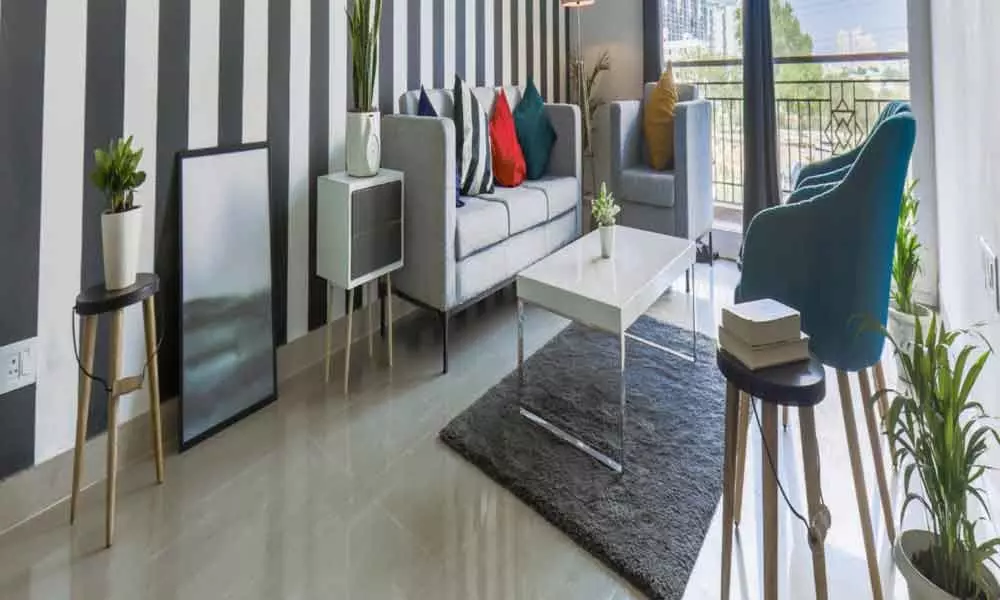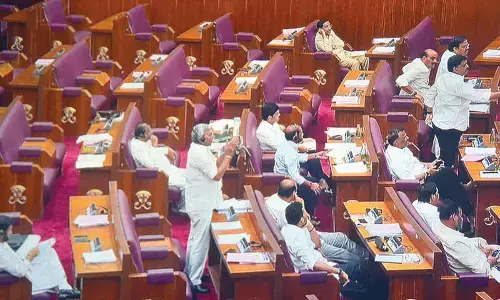New Delhi: Millennials search for new home ends here

A view of a common area in a co-living space, in Gurgaon. The concept -- which falls somewhere between PG accommodation and service apartments -- means shared living with other people in one space inclusive of furnishing, cleaning, maintenance costs and in-stay services
New Delhi: Caught between rapacious brokers, picky house-owners and beat-up spaces passing off as apartments, it's never been easy to find a home in a big city not your own -- but the many woes of the single and affluent could be over with companies entering the arena of "co-living".
The concept -- which falls somewhere between PG accommodation and service apartments -- means shared living with other people in one space inclusive of furnishing, cleaning, maintenance costs and in-stay services.
More and more companies are taking on the responsibility of tailoring your housing to your needs, helping those who can afford it say goodbye to security deposits, domestic help issues, the hassle of shifting furniture and all else that goes with moving houses.
OYO Life, launched in 2018 by hospitality firm OYO, has more than 500 buildings, 25,000 live beds and is adding 3000+ new beds every month. It has a presence in the Delhi-NCR region, Pune and Bangalore.
"The trend of co-living is rapidly gaining acceptance especially in Tier 1 metro cities," said Rohit Kapoor, CEO, New Real Estate Businesses, OYO.
"It's important to note that the concept is not new in India. From the days of 'dharamshalas' to 'chawls' in the 1960s and 1970s to the concept of paying guests and student housing/hostels, co-living has existed in India in myriad forms," Kapoor said.
But it has had a massive upgrade. With lively graffiti on walls instead of crumbling plaster and comfy oversized couches rather than old rickety chairs, most of these co-living places have been designed and furnished keeping in mind the needs of its residents.
Besides offering pre-furnished air-conditioned rooms, communal amenities like kitchen, utility space, lounge area, there is a laundry list of essential amenities such as Wi-Fi, television, regular housekeeping, curated meals, power backup, gym, CCTV surveillance and even launderettes in some places.
Housr is the new company on the block. Deepak Anand, Housr founder and CEO, has already done his maths and focuses on providing accommodation to millennials – those who are starting jobs in new cities, those migrating to new cities and working already and students.
"Most properties are not available for rent to single millennials and the available ones provide low to no services and no community experience. If one was to aggregate all existing beds across key cities, it's around one lakh and the current requirement of quality accommodation is above 25 million. So you can just imagine the supply-demand chasm. The potential for co-living is immense," he explained.
Another co-living startup Your-Space, which focuses on the student housing segment, also has an impressive run in the co-living space segment. Launched in 2016, the company has over 20 properties and 2,000 beds in eight cities, including Mumbai, Delhi-NCR, Chandigarh, Ahmedabad, Indore and Pune.
"We deliberately decided to zero in on the student housing sector only because we felt there was a vacuum in this sector. We, in our service, provide students with everything they want, right from laundry to food. Here we are dealing with two generations -- parents and students -- and it is very important that we respect their sensibilities and operate accordingly. We always encourage parents to come and visit our space and decide for themselves," said Shubha Lal, co-founder, Your-Space.
But then the home -- beside being where the heart is -- is also where the budget is. And though many shared spaces have helped residents save on brokerage, lock-in periods, and support services, the deciding factor still remains the monthly rental.
According to a recent survey by international property consultancy Knight Frank, close to 40 percent of respondents said they were most comfortable paying between Rs 1,20,000 – 1,80,000 per annum towards rental housing in key cities of India.
"The sweet spot for rentals thus remains at a monthly outflow of Rs 10,000 – 15,000," it added. The average cost of per bed per month in shared spaces is anywhere between Rs 6,000 to Rs 23,000.











